Hypoxic vs. Anoxic Brain Injuries: Getting the Compensation You Deserve
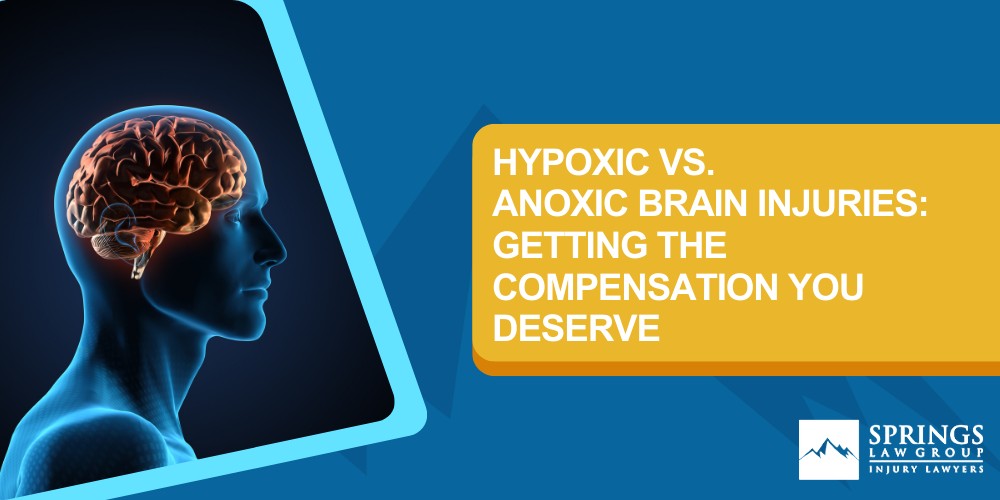
You are on your lunch break when you get a devastating call. The police officer tells you that your partner has been in a serious car accident. Your heart drops, and you leave work to be by their side.
Later on, the doctor tells you that your partner has sustained an anoxic brain injury due to the accident. The doctor mentions hypoxic brain injuries, but you’re not sure what either term means. Not much time passes when you learn from the police that the accident was caused by a drunk driver. Your partner is in a coma due to their negligent actions.
You’re left with questions:
What are hypoxic and anoxic brain injuries?
How can these injuries be treated?
Will my partner be okay?
How can we afford medical treatment?
The list goes on.
Traumatic brain injuries can be devastating, especially if the injury itself could’ve been avoided. Read on to learn the difference between hypoxic and anoxic brain injuries and how you can get compensation for your damages.
What Are Hypoxic and Anoxic Brain Injuries?
Hypoxic and anoxic brain injuries happen when the brain doesn’t get enough oxygen. The brain needs oxygen to function, so when it doesn’t get enough, brain cells begin to die. This can result in severe permanent damage and, in some cases, death.
So what’s the difference between hypoxic and anoxic brain injuries?
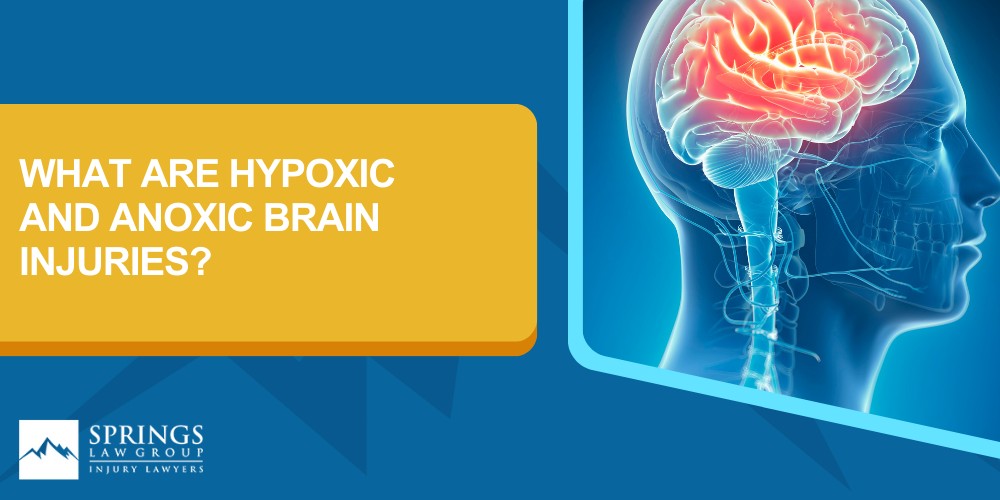
Hypoxic brain injuries are those in which the brain still receives some oxygen, but the flow is restricted. Therefore, the brain does not get as much oxygen as it needs. This can lead to gradual damage over time if the injury isn’t treated. Since the brain is still getting some oxygen, the damage from a hypoxic injury might not be permanent.
Anoxic injuries are those in which oxygen is totally cut off from the brain. An anoxic brain injury is more severe than a hypoxic brain injury. If a brain goes four minutes without oxygen, brain cells will start to die. The longer the brain goes without oxygen, the more severe the damage will be. A severe anoxic brain injury can lead to comas, permanent brain damage and sometimes death.
Hypoxic and Anoxic Brain Injury Symptoms
Hypoxic and anoxic brain injuries have varying short- and long-term symptoms.
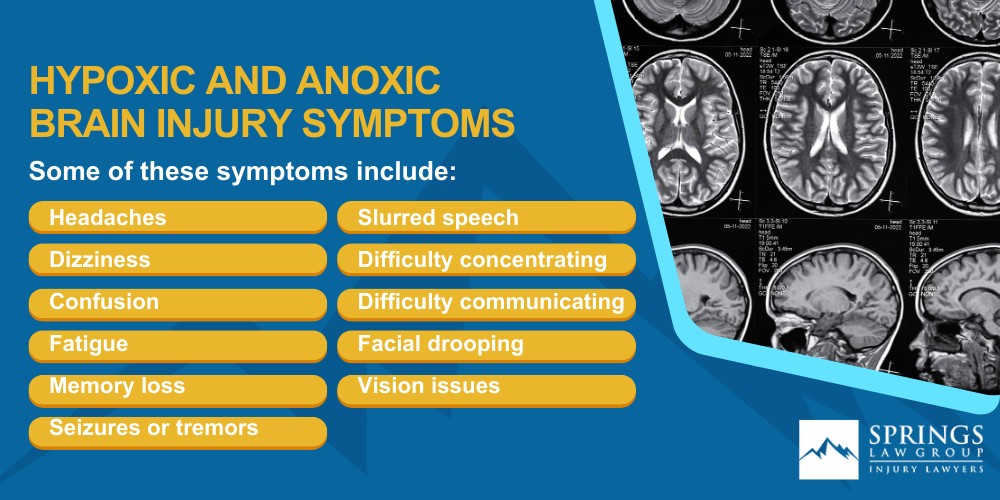
Some of these symptoms include:
- Headaches
- Dizziness
- Confusion
- Fatigue
- Memory loss
- Seizures or tremors
- Slurred speech
- Difficulty concentrating
- Difficulty communicating
- Facial drooping
- Vision issues
Talk to a healthcare professional to learn more about hypoxic and anoxic brain injury symptoms.
Causes of Hypoxic and Anoxic Brain Injuries
You can receive a hypoxic or anoxic brain injury in many ways. Some common causes include near-drowning, a heart attack, choking, and suffocation. Basically, if you are cut off from oxygen in any way, you may have gotten a brain injury. It’s important to learn about the signs and symptoms of hypoxic and anoxic brain injuries so you know when to seek medical attention.
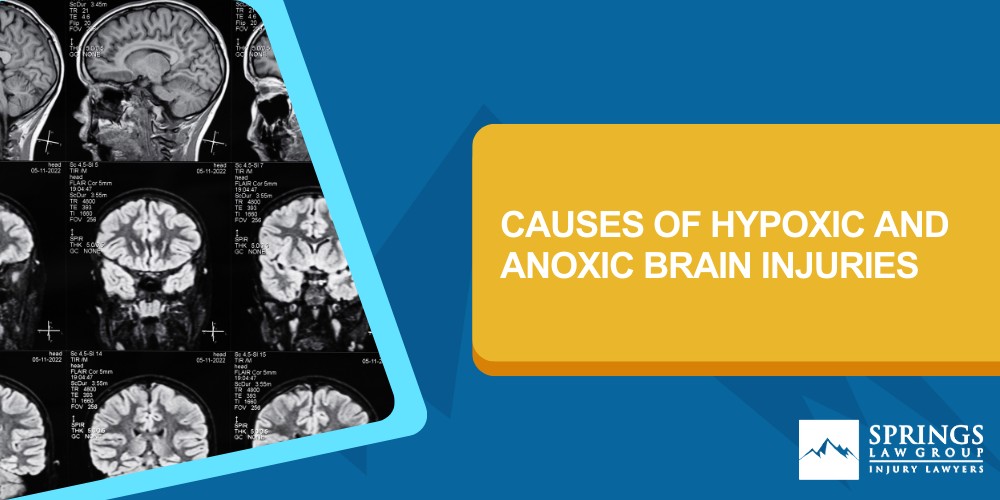
Of course, a leading cause of brain injuries is car accidents. For example, if a victim gets crushed or trapped in a car accident, oxygen can be restricted from the brain. If they don’t get help immediately, they can suffer from permanent damage or death. Hypoxic and anoxic brain injuries can also occur due to low blood pressure from loss of blood.
If you or someone you know has sustained a hypoxic or anoxic injury due to an accident that someone else caused, you may be entitled to financial compensation.
Damages You Can Seek in Hypoxic and Anoxic Claims
Hypoxia and anoxia can lead to severe lifelong damages. If your brain injury was a result of someone else’s negligence, you can file a claim and seek compensation for your losses. But what can you get compensation for?
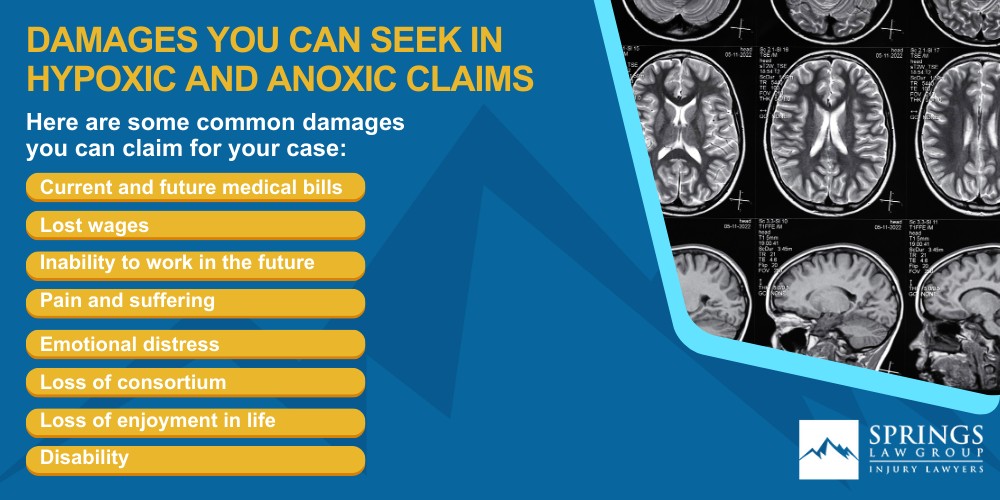
Here are some common damages you can claim for your case:
- Current and future medical bills
- Lost wages
- Inability to work in the future
- Pain and suffering
- Emotional distress
- Loss of consortium
- Loss of enjoyment in life
- Disability
How Can a Personal Injury Lawyer Help You?
You deserve compensation for the damages hypoxia or anoxia has caused you or a loved one. A personal injury lawyer can help you get maximum compensation for your losses. They will review your case, gather evidence, and negotiate with the insurance company for you. If the insurance company refuses to give you a fair settlement, your lawyer will represent you in court.

At Springs Law Group, we care about our clients. We will guide you through the claims process and help you get the compensation you deserve. Our lawyers will be with you every step of the way.
Suffering from a hypoxic or anoxic brain injury? Contact Springs Law Group today to schedule a free consultation.
